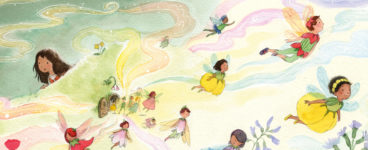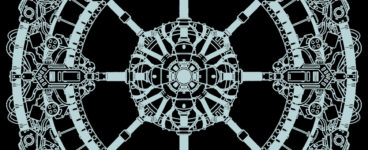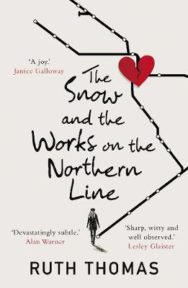‘I probably file mannerisms and conversational tics away without even being particularly conscious of it.’
The Snow and the Works on the Northern Line is the perfect novel to read while see through the dark, January days. And we’re not the only ones who think so – the novel is the current Radio 4 Book of the Week! We caught up with author, Ruth Thomas to chat more about the book.
The Snow and the Works on the Northern Line
By Ruth Thomas
Published by Sandstone Books
Happy New Year, Ruth, and congratulations on your new book The Snow and the Works on the Northern Line. Could you tell us how you came to write this novel? What did you want to explore in writing it?
My novels usually begin with a particular location or atmosphere in mind. In this case, I kept picturing a slightly fading old academic establishment set in fields somewhere, and this eventually crystallized into the shape of the Royal Institute of Prehistorical Studies, in Greenwich Park. The institute is imaginary, of course, as are various aspects of Greenwich Park (as it appears in the book, anyway). Some bits, like the view across the Thames and the path leading past the Altazimuth Pavilion, are real, but atmosphere is more important for me than sticking religiously to facts. I probably had most fun with this novel describing the outdated working practices at R.I.P.S (as the Institute’s known) and its somewhat eccentric staff. Hand in hand with the place (when I first envisaged the novel) came the main character, Sybil. I worked out a lot of her story as I went along, but I knew from the start that she should be a young woman feeling solitary and adrift in this peculiar setting, and with a lot of personal baggage to sort out. I think once you have a setting and a person to put in it (whose dilemmas you really care about), you’ve got the starting point of a plot.
The book has lots of memorable characters with their own eccentricities, flaws and vulnerabilities. Would you consider yourself a people watcher? Do you take note of things you observe in everyday life?
I wouldn’t describe myself as an active people watcher, which sounds a bit worrying! I also never take notes. I envy writers who remember to carry a notebook or laptop around so they can jot things down. I never seem to have the relevant things with me at the right moment; I just sit at my desk and try to recall scenes later. Most of my writing is about reflecting and ‘getting into the zone’ (if that doesn’t sound too hippy!) Like a lot of writers I’m also probably a bit of an introvert – more of a listener than a talker – so I do find social interactions interesting to observe, and I find ‘larger-than-life’ characters fascinating. So I probably file mannerisms and conversational tics away without even being particularly conscious of it. There seems to be so much scope for some conversations to go down odd, tangential pathways, particularly if the speakers don’t know each other all that well. I think that’s what draws me to the potential for comedy in dialogue. I suppose the characters in The Snow and the Works on the Northern Line are basically amalgams of people I’ve met over the years, and the kinds of conversations I’ve had with them. One of the most useful things anyone’s said to me as a writer was ‘Remember that everyone, even a pretty terrible person, has elements of light in them as well as shade.’ That’s what makes them believable. I always try to remember that.
The novel is set in the world of archaeology. Has this always been an interest of yours? Or was there another reason you decided to choose this setting?
When I was an undergraduate I studied Archaeology for a year alongside my main degree, English Literature. Ever since I was a child I’d liked the idea of becoming an archaeologist – partly because, pootling around my family’s back garden, I used to come across little bits of broken blue and white china and imagine that they might have come from some amazing piece of ancient pottery. Once, aged eight or so, I came across some abandoned old ceramic insulators from an old phone pylon, and fantasized that they were Roman goblets! My sister and I even wrote to Blue Peter about them (though, oddly, we never got a reply…) Tangible objects say such a lot about human lives, whether it’s a recyclable cup made in 2021 or a bracelet from the Bronze Age. Actually, for this reason, I think writing and archaeology are quite comparable. Some of the best writing, I think, centres around physical objects rather than abstract ideas: it’s the small ‘throwaway’ things that make up the bigger picture. So basing the novel around an archaeological institute of some sort seemed quite a natural way for me to proceed. I also just wanted to write about a museum. I love museums – particularly small, old-fashioned ones. Some of my favourites are the Grant Museum in London, the Bell-Pettigrew in St Andrews and the Gallery of Paleontology and Comparitive Anatomy in Paris. That one in particular is quite a gothic marvel, and it’s actually where I drew most of my inspiration for the gallery at R.I.P.S.
Having said all this, I was not a particularly impressive Archaeology student! Like Sybil, I had problems finding The Beaker People all that interesting. It really did seem to me, in lectures, that we were just looking at a series of slightly dull earthenware pots (a very Philistine thing to say, I know…) I think I’d pay a lot more attention these days and hopefully make more intelligent connections, but at the time I often found myself day-dreaming, and wondering when the end-of-lecture bell would ring. For the novel I wanted to revisit that youthful sense of impatient lethargy, and being in the wrong place at the wrong time. But I also wanted Sybil to realise, at some point, that she could be missing out by not taking new and interesting things seriously.
You pepper the novel with Sybil’s poetry, a project she has taken on to get over heartbreak. What does poetry mean to you as a writer and a reader?
I love poetry but have discovered, after much trial and error, that I’m not a poet. My poems always seem to extend themselves into sentences, then paragraphs, then start forming themselves around a character and a setting! I love imagery and brief allusions to things, but find that I can write it all better in prose. A few years ago I spent some time lecturing in creative writing, and my students and I would talk about poetry as well as novels and short stories, and the qualities they share. We’d discuss the way poetry often draws on story-telling ideas, and prose can work brilliantly when it uses poetic devices to conjure up certain moods and atmospheres. Although I’m not a poet I’m really conscious of the value of metaphor and rhythm and pace, at a sentence level, in novels and short stories. Prose has to have as much impact on the ear as poetry does. I think someone like Grace Paley is a great example of a short story writer who worked like a poet. She’d make these brilliant imaginative leaps and introduce all kinds of strange imagery into her stories. It made her collections seem like wonderful, sparkling jewels, so full of light and colour, and so memorable because of that. These days I run a reading group and have been thinking a lot more about poetry alongside the prose we read. For me the greatest poetry seems almost to transcend time. We were reading John Clare’s ‘November’ recently, which is all about a day in the countryside where the fog is so thick that the poet can only hear some cows very nearby in a field, rather than see them. It feels so existential and other-worldly. He wrote it in the 18th century but it could have been written yesterday.
Other than poetry and fantasising on possible revenge, do you have any advice on getting over heartbreak?
That’s an interesting question! I think I was trying to work that out myself, on Sybil’s behalf, over the course of the book. I suspect – although it sounds like a cliché – that forgiveness is vital if you’re going to move on from having your heart broken. Also, you have to engage with new things and try to make new connections. During the novel, Sybil comes across the poem ‘A poison tree’ by William Blake, where the first lines are: I was angry with my friend/I told my wrath my wrath did end; I was angry with my foe/I told it not, my wrath did grow. I wanted to write about the way Sybil was keeping her feelings of betrayal and loss very closely guarded when it might have been better if she’d confided in someone. Not speaking was probably not the healthiest thing she could have done. There were bound to be repercussions.
What books have you read recently that you’ve enjoyed?
Like a lot of people, 2020 was a pretty good reading year for me, and it looks as if 2021’s shaping up to be the same… One book I really enjoyed was Wilful Disregard by the Swedish writer Lena Andersson. It tells the tale of Ester, an academic and poet, obsessively in love with a famous artist (who is, it’s clear to the reader if not to Ester, a pretty unpleasant and self-regarding man.) As well as being quite tragic in some ways, it’s also extremely funny. Lena Andersson is so good at describing the humiliating and rather awkward lengths her heroine will go to, to be with the object of her desire. Another book I loved was Kevin Barry’s short story collection, Dark Lies the Island. He’s a brilliantly funny writer, often working with very dark themes. ‘Across the Rooftops’, one of my favourites, manages to be both wistfully beautiful about a potential (most likely doomed) romance, and also very down-to-earth. I love writers who combine the ethereal with something very ordinary. Winter in Sokcho by the French-Korean writer Elisa Shua Dusapin is also very good. Set in a border town between North and South Korea, it’s brilliant at describing the melancholy of a small, backwater town where most people seem to spend all day gutting fish, while the young protagonist so keenly wants to get away and begin a new existence. I’ve been reading a lot more literary essays recently, too. They are such a wonderful form of prose. Last year I read a lot by the Irish essayist Chris Arthur, who’s written some incredibly moving and wonderfully observed pieces in his collection Words of the Grey Wind.
Other than reaching readers with your new novel, do you have any other wishes for 2021?
Of course it’s a massive cliché to say ‘world peace’ but, writing this a day after the storming of Capitol Hill, it seems even more relevant this year. I wish that, after the pandemic is finally in retreat, decent principles and sane, fair policies begin to emerge. There’s such a divide at the moment in so many areas – health, education and work opportunities being three of the most obvious. On a quieter, more personal front, I also wish that we can start going back into bookshops and cinemas and museums again before too much longer. And theatres and cafes. They feel like such a huge absence in our lives at the moment. I wish, and hope, that 2021 will end a lot more calmly than it started – in like a lion, out like a lamb.
The Snow and the Works on the Northern Line by Ruth Thomas is published by Sandstone Books, priced £8.99.
Catch the Radio 4 adaptation here.
ALSO IN THIS ISSUE

 The Fairy Song: Interview with Illustrator Ruchi Mhasane
The Fairy Song: Interview with Illustrator Ruchi Mhasane
‘There was a wealth of work to be inspired by, and yet I think the true inspiration was the real Sco …

 Deep Wheel Orcadia
Deep Wheel Orcadia
‘Astrid shutdarkens her eyes and holds the device to her chest, as if breathing was lifting Orcadia …













